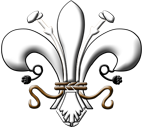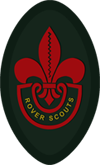Rover Scout Proficiency Badges
For badge locations, please see the uniform page
The general scheme
The general scheme of Rover Scout proficiency badges is as follows:
- An admission test (Rover Squire) set out in Section 5.
- Five special proficiency badges-the Scoutcraft Star; the Rambler’s Badge; the Project Badge; the Service Training Star; and the Rover Instructor Badge.
- One additional proficiency badge-the B.-P. Award.
- A Scout entering the Crew, having already gained the Queen's Scout badge, will wear a miniature replica of it between the shoulder and elbow of the left arm. A Rover who is also a Scout Officer may not wear this badge.
- Rovers who are Interpreters wear an emblem (similar to those worn by Senior Scouts), above the right breast pocket, or in a similar position on a jersey, indicating the language or languages spoken.
- On gaining the B.-P. Award a Rover will remove from his uniform all other special proficiency badges he holds, with the exception of the Rover Instructor Badge.
The B.-P. Award

The B.-P. Award is worn on the left Epaulette. Before being awarded the B: P. Award, a Rover Scout must:
- Hold the Rambler's Badge, the Project Badge, the Scoutcraft Star, and the Service Training Star.
- In the opinion of the G S M., R.S.L. and Crew be setting a personal example of the Scout way of life, and be carrying out the Rover motto "Service".
- Have an interview with the local Commissioner, or Scout Officer appointed by him/her for the purpose.
The Scoutcraft Star

The Scoutcraft Star is worn on the left epaulette above the Rambler's Badge.
The conditions for its award are as follows:
- A Rover who holds a Warrant as a Pack or Troop Scout Officer must qualify at the appropriate Preliminary Training Course and must give satisfactory service as a Scout Officer for a period of at least six months, to qualify for the Star. In the case of a Lone Rover or similar, such alternate as is possible will be accepted e.g. Working with another youth organisation.
- A Rover who does not hold a Warrant must fulfil the following requirements:
- He must camp on at least ten separate occasions aggregating not less than ten nights on three or more different camp sites, and must comply strictly with "Camping Standards". He/she must keep a log of these camps and submit it to his R.S.L and Crew.
- He/she must be competent to instruct and examine a Senior Scout in any two of the undermentioned badges: Astronomer Camp Warden, Forester, Master Cook, Naturalist, Pioneer, Tracker. (He/she need not necessarily act as an instructor or examiner in the badges selected.)
- The Rover must be competent to instruct and to examine a Senior Scout in the requirements of one of the undermentioned Senior Scout badges: Mountaineer Rock Climber, Cave Explorer, Hiker, Map Maker, Pathfinder, Pilot (He/she need not necessarily act as an instructor or examiner) and must be qualified in First Aid to at least the standard of the Ambulance Badge.
- He must have completed as a member of a team of Rovers a journey extending over four consecutive days (with three nights out) or two journeys each extending over 48 hours (each with two nights out) not reckoning travelling time to starting point and from finishing point The journey must be organised by himself/herself and approved by his R.S.L. and local Commissioner as of sufficiently high standard The journey may be by land or water, at home or abroad, but it must present a definite test of endurance as well As be calculated to bring out the qualities of self-reliance, initiative, determination and leadership. He/she must submit a log of the expedition to his RSL and Crew as soon as possible and not later than three months after the completion of the expedition. Or, Walk, or walk and make passages in a kayak or boat (sailing or rowing), and an aggregate of 100 miles (or go an aggregate of 400 miles by pedal cycle) outside towns, during the weekend or holiday hikes; the Rover must keep a log of his journeys to be handed in on completing the total of 1oo (or 400) miles; this log should give dates, places and distances and should preferably give information that would be of interest to other hikers, such as places of interest to be visited en route, good camping places, inns, hints for finding the way at difficult points, together with passages notes for best journeys with tidal or other useful information and plans of harbours, inland, waterways, etc.; sketch maps and nature notes should be included.
- The Rover must choose, plan, and devote at least six months to a Project, and must keep a record of his activities. At least three times during the period he must report progress to the R.S.L. and Crew, producing his record, supported by any models, charts, maps or other exhibits which may be needed to elucidate it. On these occasions he may seek advice or assistance from the Crew if he feels he needs it.
- A " Project " may be defined as a self-imposed task demanding skill, application and care. The Rover picks the subject of his Project for himself. There is no restriction on his choice of subject (within reason), but it should preferably be something which bears no direct relation to his means of livelihood, and with which he has formerly had little to do, or alternatively a subject in which he is already well versed, with the intention of his reaching a considerably higher standard of achievement in it. The subject chosen for a Rover's Project should be formally approved by the R.S-L. And Crew as suitable and worthwhile.
- When the Rover is himself satisfied that he has completed his selected Project, he must demonstrate the result of his work to the R.S.L. and Crew. The R.S.L. and Crew, after seeking any necessary expert advice, then decide if he has reached a satisfactory standard of attainment.
- Hold the Service Training Star.
- Show that he is acting, with the approval of his R.S.L., as an instructor to a Junior Scout Troop/Wolf Cub Pack, Boy Scout Troop, or Senior Scout Troop to the satisfaction of the G.S.M. and C.M. or S.M. concerned.
- In the case of Junior Scout Troop/Wolf Cub Packs the Rover must:
- have a knowledge of, and ability to instruct in, the subjects of the First and Second Star/Step badges and two proficiency badges.
- show a reasonable knowledge of the Junior Scout/Wolf Cub's Manual and Kipling's Jungle Books.
- In the case of Scout and Senior Scout Troops the Rover must:
- have a knowledge of, and ability to instruct in, the subjects of the First Class badge and two Senior, proficiency badges, one of which must be a Senior Public Service badge;
- show a reasonable knowledge of "Scouting for Boys".
- The badge will be surrendered within six months of the Rover Scout ceasing to act as an instructor.
The Rambler's Badge

The Rambler's Badge is worn on the left epaulette. The conditions for its award are as follows:
The Project Badge

The Project Badge is worn on the right epaulette. The conditions for its award are as follows:
The Service Training Star

Service Training Star is worn on the right epaulette above the Project Badge, if held. Before being awarded the Service Training Star a Rover must give six months' service with a Group as a Scout Officer (whether warranted, on probation for a warrant, or under training) to the satisfaction of the local Commissioner and the G.S.M. of the Group concerned. In the case of a Lone Rover or similar, such alternate as is possible will be accepted e.g. Working with another youth organisation.
The Rover Instructor Badge
The Rover Instructor Badge is worn on the right breast above the line of the pocket. Before being awarded the badge a Rover must:
![]()


